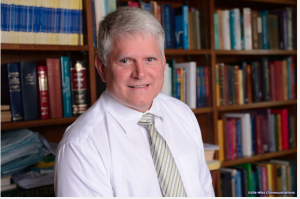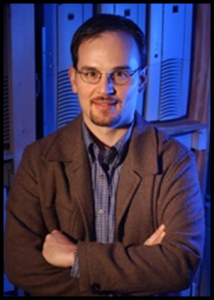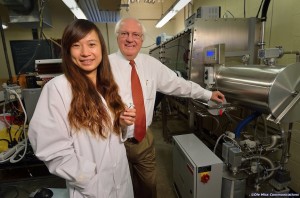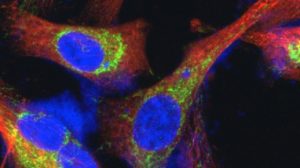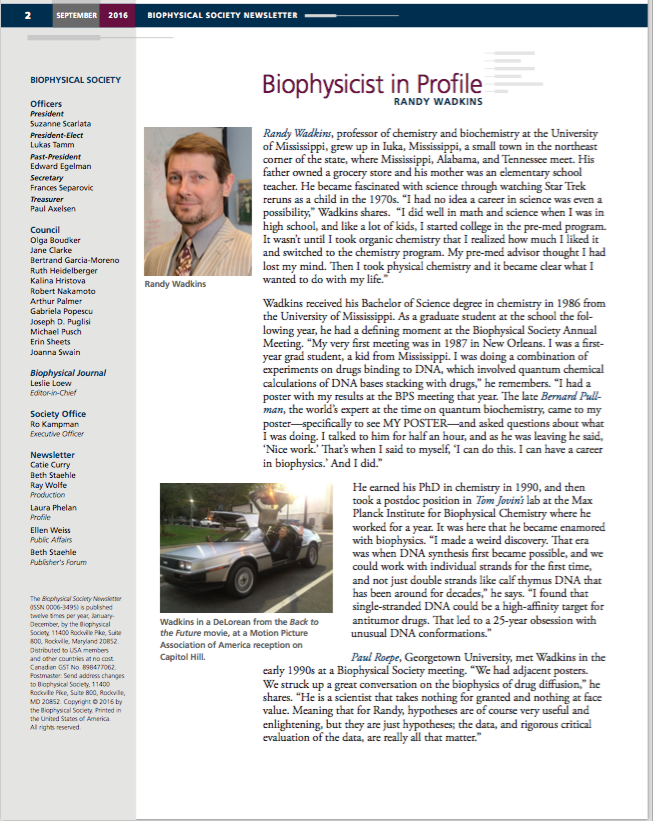The College of Liberal Arts at the University of Mississippi recognized a Department of Chemistry faculty member Friday (May 13) for his excellence in teaching. Steven Davis, professor of chemistry and biochemistry, was given the Cora Lee Graham Award for Outstanding Teaching of Freshmen. Dr. Davis was recognized at the university’s spring faculty meeting and was also honored this past Saturday at the university’s 164th Commencement. He received a plaque and $1,000, and his name will be added to the award plaque in the dean’s office. Davis said he is pleased and honored that his students and the college have chosen to recognize his commitment to teaching. “It is a great honor to be included in the list of awardees,” said Davis, who received his doctorate from the University of Virginia and has been on the UM faculty for 28 years. “I really enjoy working with freshman students as they adjust to college and begin their academic training here. “Ultimately, I hope my students view my class as gaining skills to be used throughout their careers, not just as a grade to move onto the next class in their majors.” Established 30 years ago by Cora Lee Graham of Union City, Tennessee, the Graham award aims to help retain better professors who teach freshman classes in the College of Liberal Arts. Criteria for this annual award also include excellence of class instruction, intellectual stimulation of students, and concern for students’ welfare. Greg Tschumper, chair and professor of chemistry and biochemistry, said Davis is one of the most enthusiastic and dedicated teachers he’s ever worked with. “He has become one of the department’s most effective instructors for our first-year general chemistry sequence, aka Freshman Chemistry,” Tschumper said. Also, click here to see a press release from the The College of Liberal Arts.
Archive for the ‘News’ Category
Davita Watkins Wins Prestigious NSF CAREER Award
Davita Watkins, an assistant professor of chemistry and biochemistry, has won a prestigious National Science Foundation CAREER Award for her research in elucidating the role of sigma-hole interactions in advanced functional materials that she develops in her labs on the campus of the University of Mississippi. The award totals approximately $500,000 and has a duration of five years. The operational efficiency of functional materials—ranging from solar-harvesting polymers to nanosized therapeutic drug delivery systems—depend on two factors: (1) the nature of the constituting components (i.e., molecules); and (2) the arrangement of those molecules to yield a useful overall composition. The ability to control these molecules and understand their organization into discrete nanoscale arrays that exhibit unique properties affords transformative adva nces in chemistry and material science. The research focus of this CAREER plan is to establish guidelines towards developing molecules that absorb natural energy and produce/conduct electrical current. These molecules are unique in that they are programmed to self-organize and form structures that enhance those light-harvesting properties. The new knowledge gained from this research leads to the development of more efficient organic-based materials and devices; thereby, advancing the pursuit of technological applications (e.g., electronic devices and biomedical implants). Moreover, the project affords opportunities to technically train the next generation of scientists and engineers. Specifically, outreach initiatives are aimed towards increasing the number of females and minorities in chemistry-related fields by immersing rising high school seniors into a summer research program called Operation ICB (I Can Be). The program ensures continuation in scientific career fields by establishing networks and mentorship across disciplines; in turn, diversifying the future of the scientific workforce and culture. Move information about Dr. Watkins can be found on her research program website at http://watkinsresearchgroup.org.
nces in chemistry and material science. The research focus of this CAREER plan is to establish guidelines towards developing molecules that absorb natural energy and produce/conduct electrical current. These molecules are unique in that they are programmed to self-organize and form structures that enhance those light-harvesting properties. The new knowledge gained from this research leads to the development of more efficient organic-based materials and devices; thereby, advancing the pursuit of technological applications (e.g., electronic devices and biomedical implants). Moreover, the project affords opportunities to technically train the next generation of scientists and engineers. Specifically, outreach initiatives are aimed towards increasing the number of females and minorities in chemistry-related fields by immersing rising high school seniors into a summer research program called Operation ICB (I Can Be). The program ensures continuation in scientific career fields by establishing networks and mentorship across disciplines; in turn, diversifying the future of the scientific workforce and culture. Move information about Dr. Watkins can be found on her research program website at http://watkinsresearchgroup.org.
Previous NSF Career Awardees in the Department of Chemistry and Biochemistry include:
Andrew Cooksy (1995)
Nathan Hammer (2010)
Amal Dass (2013)
Jared Delcamp (2015)
Kit Bowen (B.S. 1970) Honored by ACS with 2017 Award in Experimental Physical Chemistry
The American Chemical Society (ACS) Division of Physical Chemistry recently announced the winners of the 2017 Senior and Early-Career Awards in Theoretical and Experimental Physical Chemistry. Prof. Kit Bowen, E. Emmet Reid Professor of Chemistry at Johns Hopkins University, was elected for seminal studies of molecular and cluster anions by negative ion photoelectron (photodetachment) spectroscopy. Prof. Bowen received his Bachelors in Science in Chemistry degree from the University of Mississippi in 1970 and his doctorate from Harvard in 1977 before joining Johns Hopkins in 1980. Prof. Bowen also received a Taylor Medal from the University of Mississippi in 1969. At this coming summer’s ACS National Meeting in Washington, DC, Prof. Bowen will be honored at a special dinner, and separately at a reception where he will receive his award. A half-day symposium will also be organized in Prof. Bowen’s honor, where he will deliver his scientific award address.
New Chair Announced for Department of Chemistry and Biochemistry
Dr. Gregory S. Tschumper has accepted an appointment to succeed Charles Hussey as the Chair of the University of Mississippi Department of Chemistry and Biochemistry. Dr. Hussey became the new associate dean for research and graduate education in the university’s College of Liberal Arts. Walter Cleland continues as Assistant Chair for the department.
“It’s very humbling to be named chair because there have been so many people that I respect that have been in this office before,” Tschumper said. Tschumper has watched the department grow since joining University of Mississippi in 2001 and what the previous department chair and other departmental leaders have accomplished.
“There have been a number of really great people in the department that have worked really hard to get us where we are today,” Tschumper said.
Tschumper received a Bachelor’s degree in Chemistry from Winona State University in 1995. He completed his Ph.D. in Chemistry the University of Georgia in 1999. Tschumper also completed postdoctoral appointments at ETH Zürich, Switzerland and Emory University before coming to University of Mississippi. Tschumper’s research is focused on the development and use of state-of-the-art electronic structure methods to describe the effects of weak non-covalent interactions in synthetic and biological materials.
Tschumper has received several professional honors and awards, including the 2015 University of Mississippi Faculty Achievement Award and the 2009 Cora Lee Graham Award for Outstanding Teaching of Freshmen. He has also served as the Computational Chemistry Research Focus Group Leader on an EPSCoR award from the National Science Foundation that has brought in more than $20 million to the state of Mississippi for research and STEM education.
Department of Chemistry & Biochemistry at the University of Mississippi Wins Diversity Award
The University of Mississippi Department of Chemistry and Biochemistry has received the Stanley C. Israel Regional Award for Advancing Diversity in the Chemical Sciences for the Southeastern Region of the American Chemical Society (ACS), for the year 2015. The Department was nominated for the award by the Ole Miss local section of the ACS.
There were a number of accolades highlighted in the nomination package, which were the direct result of the department’s longstanding efforts to increase participation of women and underrepresented minorities in chemistry. Of particular note was the recent hiring of the Department’s first African-American woman as an Assistant Professor in 2014, and the hiring of recent African-American graduates, Dr. Margo Montgomery-Richardson and Dr. Shana Stoddard, as Assistant Professors at Alcorn State University and Rhodes College, respectively. Additionally, a former summer program participant, Sharifa T. Love-Rutledge (Tougaloo College Undergraduate) made history by becoming the first African-American woman to graduate from the Department of Chemistry at The University of Alabama in Tuscaloosa. Overall, five African-American and one Hispanic Ph.D. students, three of whom are women, earned their chemistry doctorates from the Department of Chemistry and Biochemistry over a one year period during 2012-2013.
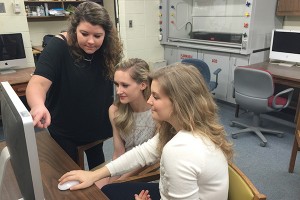
UM BS Chemistry majors (from left) Ashley Williams, Sarah Sutton and Katelyn Allen conduct undergraduate research.
Other notable achievements include a graduate population that has maintained a 30-50% female and a 10-15% minority rate over the past five years, and a B.S. Forensic Chemistry program where 76% of the majors are women.
The Department has vigorously adopted a number of new strategies to recruit underrepresented students into the chemistry program. There is a new awards celebration, which, in 2015 alone, recognized 32 female undergraduate chemistry students. The Department has implemented a “welcome to school” picnic for undergraduate chemistry students, which also has increased the number of women and minority chemistry majors. Further, the Department recently modified its ACS accredited B.S. in Chemistry degree to have an optional Biochemistry emphasis to attract pre-med students, which resulted in women becoming nearly half of those majors.
The Department will receive a Stan Israel plaque and $1000 check to continue its efforts. The Department of Chemistry and Biochemistry has over 300 undergraduate chemistry majors and over 60 graduate students. It offers Bachelors of Arts, Bachelors of Science, Masters, and Doctoral degrees. The Ole Miss local section of the ACS is located in north Mississippi and encompasses 21 counties. The chapter’s goals center around meaningful social and professional relationships between chemistry related professionals including high school and college students, teachers at all levels in the chemical sciences, and professional chemists.
Chemistry Professor Charles Hussey Named Associate Dean
Prof. Charles L. Hussey, the multiple award-winning chair and professor of chemistry and biochemistry, who received the 2015 UM Distinguished Research and Creative Achievement Award, is the new associate dean for research and graduate education in the university’s College of Liberal Arts.
Hussey will assume his new duties sometime between Oct. 1 and Jan. 2, 2017.
“I am very excited about the chance to serve in this role and anxious to get started,” said Hussey, who also received both the Electrochemical Society’s Max Bredig Award in Molten Salt and Ionic Liquid Chemistry and the Southeastern Conference’s Faculty Achievement Award in the 2014-15 academic year.
“The appointment of Dean (Lee) Cohen gives us new direction, because he is very interested in improving research/scholarship and graduate education in the college. I want to be a part of helping him move the college forward in these areas.”
Cohen said Hussey brings much to the the position.
“I am delighted that Dr. Hussey has agreed to assume this very important new role in the College of Liberal Arts,” Cohen said. “I believe Chuck is ideal for this position given that he has significant administrative experience serving as the chairperson of a large and complicated department, has an exemplary research record, and he has a great deal of knowledge, involvement and success working with graduate students.”
Hussey said his short-term goals are to study the various departments and disciplines in the college to learn about the roadblocks they face when trying to engage in research, scholarship and graduate education, as well as the opportunities they have.
“Once I have a sense of the issues, then we will work together with departments to develop long-range strategies that make use of our available resources to attack these roadblocks,” he said. “I also see potential for the growth of new graduate programs in the college.”
Hussey’s new duties will end his longstanding tenure as chair of chemistry and biochemistry, a position he said he has thoroughly enjoyed. Still, he doesn’t plan to completely leave his discipline.
“As the associate dean for research and graduate education, I think it is imperative that I continue to pursue my own research as much as practicable,” Hussey said. “I find research to be engaging, relaxing and enjoyable. Besides, this is what we should be doing as faculty at an R-1 university.”
Hussey, who holds a doctorate in chemistry from Ole Miss, joined the faculty in 1978 after serving a four-year active duty term as a military scientist at the U.S. Air Force Academy’s Frank J. Seiler Research Lab. For more than 35 years, he has researched the electrochemistry and transport properties of ionic liquids and molten salts, an outgrowth of the work he began at the Seiler Lab.
He has authored or co-authored more than 150 refereed journal articles, book chapters, patents and government technical reports. His work has been supported by the National Science Foundation, Air Force Office of Scientific Research, Alcoa, U.S. Department of Energy and U.S. Department of Defense.
He also served as the technical editor of the Journal of the Electrochemical Society, the world’s top electrochemistry journal, since 2000.
From https://news.olemiss.edu/charles-hussey-named-associate-dean-um-college-liberal-arts
NIH Grant Awarded for Breast Cancer Research
Two University of Mississippi researchers working to find new drugs to stop the spread of breast cancer to other organs have received a major award from the National Institutes of Health to continue their studies for three years.
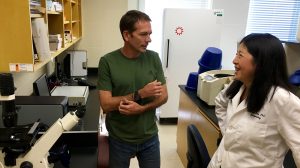
Mika Jekabsons (left) and Yu-Dong Zhou (right) discuss their breast cancer research in one of the laboratories.
Yu-Dong Zhou, of the Department of Chemistry and Biochemistry; and Mika Jekabsons, associate professor of biology; are co-principal investigators for “Antimetastatic Drug Discovery that Targets Metabolic Plasticity.” The new National Institutes of Health/National Cancer Institute grant for $426,720 began July 15 and runs through June 30, 2019.
“Over 90 percent of cancer mortality is directly associated with invasion of cancer cells into vital organs,” Zhou said. “No treatment option effectively prevents metastatic progression.”
According to the American Cancer Society, the five-year survival rate for the 162,000 American women with metastatic breast cancer is only 23 percent. The long-term objective of the duo’s research is to discover and develop new drugs – or find new uses of existing drugs – that curb the metastatic spread of breast cancer.
“Surgical removal of tumors within vital organs is often not possible, which leaves molecular-based therapeutics as the only alternative treatment,” Jekabsons said.
To tie in with this project, this research will continue to provide valuable opportunities for training in the biomedical sciences. Zhou and Dale Nagle, professor of biomolecular sciences, have taken on almost a dozen Sally McDonnell Barksdale Honors College students, all majoring in biology, biochemistry or pre-pharmacy, with the aim of training them in laboratory-based anticancer research and natural product drug discovery.
“I am only an enthusiastic collaborator,” Nagle said. “Under the leadership of Drs. Zhou and Jekabsons, these brilliant and inquisitive minds are making vital contributions to research that looks to eradicate the spread of breast cancer.
“This is certainly an experience that will advance their future careers and that they will be proud of years from now.”
Breast cancers can spread to multiple vital organs such as the lungs, bones, brain and liver. Genetic studies of breast cancer cells that have invaded other organs led to the identification of candidate genes that may predict their potential to invade other tissues.
“We have treated invasive breast cancer cells growing in culture dishes with diverse chemical compounds obtained from natural products as a means of searching for potential drug leads that could stop their growth,” Zhou said. “Our preliminary data support this hypothesis by demonstrating that compounds which disrupt tumor metabolism specifically suppress the growth of breast cancer cells that had previously invaded select vital organs.”
Jekabsons added, “This research validates and expands our initial efforts using FDA-approved oncology drugs by demonstrating that diverse novel chemicals from plants and other natural products may prevent the growth of selective subtypes of breast cancer cells that have invaded specific organs.”
The study was prompted by the finding that some chemicals, which disrupt cellular energy production, prevent the growth of selective subtypes of breast cancers that previously invaded other organs. The Ole Miss researchers are working to evaluate the metabolic profiles of the different subtypes and determine how different natural product chemicals may interfere with specific metabolic pathways.
“Based on our observations, we propose a potentially targetable ‘metabolic plasticity’ model for organ-selective metastasis,” Zhou said. “Specifically, cancers that invade other organs are metabolically adaptable and assume metabolic characteristics that are most suitable for growth in the target organs they invade.”
This project brings together Zhou’s expertise in cancer research and Jekabsons’ in a tumor cell’s energy production to identify promising leads that target the spread of malignant breast cancer cells, especially those that suppress tumor cell “food intake” in those vital organs invaded by them.
“Our ultimate goal is to find an effective approach that can improve the prognosis of patients affected by metastatic disease,” Zhou said. “Such an interdisciplinary research is only possible when people in different fields of science work together towards a common goal in a highly supportive environment.”
Zhou and Jekabsons have been collaborating for a decade. Nagle and Ikhlas Khan, new director of UM National Center for Natural Products Research in the School of Pharmacy, plan to continue their collaboration with Zhou and Jekabsons on this project.
“We are all extremely grateful to both Drs. Charles Hussey and Alice M. Clark for actively making Dr. Zhou’s transition from the School of Pharmacy to the Department of Chemistry and Biochemistry possible,” Nagle said.
In line with Academic Research Enhancement Award program objectives, this project will strengthen the UM natural products and metabolism research environment and give students hands-on experience in antitumor drug discovery and tumor bioenergetics research.
The project is funded through NIH grant No. 1R15CA199016-01A1. Original post: https://news.olemiss.edu/um-professors-receive-nih-grant-breast-cancer-research
Biophysicist in Profile: Randy Wadkins
To accompany the September 2016 Biophysical Society Newsletter feature posted here, Randy Wadkins, professor of chemistry and biochemistry, associate member of the UMMC Cancer Institute, and American Association for the Advancement of Science Science and Technology Congressional Fellow 2015–16, answers a few more questions:
How did you get started in science in general and biophysics in particular?
I grew up in a small town in Mississippi. I had no idea that that a career in science was even a possibility. I did well in math and science when I was in high school, and like a lot of kids, I started college in the pre-med program. It wasn’t until I took organic chemistry that I realized how much I liked it and switched to the B.S. in chemistry program. My pre-med advisor thought I had lost my mind. Then I took physical chemistry and it became clear what I wanted to do with my life. The biophysics began in graduate school.
Are (were) other members of your family involved in science? If not, what sort of work were your parent(s) or guardian(s) involved in while you were growing up?
I had a very blue-collar life growing up. The closest thing to science was when my dad worked briefly for the county health department and sampled well water to bring back for contaminant testing. He later owned and managed a grocery store. My mom was an elementary school teacher. My fascination with science really began with watching Star Trek reruns in the 1970s.
Where did you grow up?
Iuka, Mississippi; in the northeast corner, where Mississippi, Alabama, and Tennessee meet. It was called the “tri-state area.”
When you were a child, what career did you hope you would have as an adult?
I thought I would be a medical doctor because that’s all I knew about.
What schools have you attended/are you attending? What degrees do you hold, and when did you earn them?
I attended the University of Mississippi and received a B.S. in chemistry in 1986. I wasn’t quite sure what I was doing then, and ended up staying on for graduate school as well. I received my Ph.D. in chemistry in 1990.
Please describe any postdoctoral work you have done.
The post-doctoral era was one of the most interesting and stressful periods of my life. The Ph.D. glut that everyone complains about now is nothing new, so I ended up doing a lot of post-doc jobs. For my first one, I spent a year in Germany at the Max Planck Institute for Biophysical Chemistry. That’s where I really got the biophysics bug. Later I was at St. Jude Children’s Research Hospital in Memphis, followed by the Naval Research Laboratory in DC. I nearly gave up on science as a career, but caught a break.
Please describe your area of specialization/research interests in ten words or less.
I have become fascinated with DNA as a nanomaterial.
Provide more detail about your area of specialization. Who or what got you started in this area?
When I was at the Max Planck Institute in Tom Jovin’s lab, I made a weird discovery. That was when DNA synthesis first became possible, and we could work with individual strands, not just double strands like calf thymus DNA that had been around for decades. I found that single stranded DNA could be a high-affinity target for antitumor drugs. That led to a 25-year obsession with unusual DNA conformations.
What positions, if any, have you held between postdoc and current position?
My first non-postdoctoral position was at the San Antonio Cancer Institute in Texas. From there, I was hired as an Assistant Professor of Oncology at the Johns Hopkins School of Medicine in Baltimore.
What is your current position? Please describe any current projects or research.
I am Professor of Chemistry and Biochemistry at the University of Mississippi. I am in the last year of a NCI R15 grant to study unusual DNA structures as drug targets. My lab just moved into the National Center for Natural Products Research on campus. My research is at the intersection of small molecules, natural products, DNA, and proteins that bind DNA.
What has been the biggest challenge in your career? How did you face it?
The same challenge everyone in the business faces: keeping my lab funded. I’ve been very fortunate to have had funding from one source or another for 18 straight years. It hasn’t always been enough to do everything we wanted to do, but it kept the doors open and the students busy. You face it by continuing to try to get funding. If you have a basic science lab, nobody comes to you. You have to go to them and sell your idea.
What is your favorite thing about biophysics?
That no matter how complex a problem might be, the underlying physics is fairly simple. I love trying to piece together the steps from the simple to the complex.
What is the most rewarding aspect of your work?
That has evolved over the years. It used to be about the excitement of a new discovery, and there’s certainly still that. But, it is also very rewarding to be training the next generation of scientists and to see them be successful after they leave my lab.
What is the most challenging aspect of your work?
Finding time to be in the lab! Between teaching classes, grading, sitting on committees, writing reports, writing grant proposals, and going to meetings, there’s not a lot of time left to be in the lab, which is where I most want to be.
You have spent the last year as the BPS Congressional Fellow. How has this differed from your work at the university?
This has really opened my eyes as to how the government really works. It’s much different from the civics classes I took in elementary school (do they even teach those anymore?). I handle the healthcare portfolio for the Congressman, and that is an incredibly complex issue, but unlike biophysics, the underlying principles are not simple. Nobel Laureate Michael Levitt was here for Biophysics Hill Day, and I told him that if he thought quantum mechanics was difficult, try Medicare billing codes.
What will you miss the most about the experience when you are back at the university?
What are you most looking forward to about your return?
I’m going to miss the astonishing learning experience you get on the Hill. Not only do Nobel Laureates drop by to give briefings, so do directors of programs at NIH, NSF, NASA, etc.; advocacy organizations for every imaginable cause; celebrities of every magnitude; political leaders of every stripe; business leaders of every area of commerce; military leaders; they all come to the Hill to inform Congress what is happening in the world. It is a fire hose of knowledge, and I will miss trying to drink in every drop.
I’m most looking forward to returning to the university and trying to put this experience to good use in fostering government outreach efforts.
I am also playing Powerball every week on the slim odds that I could stay in the Congressman’s office another year.
What are your future plans for your career and/or research? What do you hope to contribute to biophysics?
I plan to continue looking into uses of DNA as a nanomaterial, but everyone working in the field knows that DNA is not cost-effective for mass production. I look forward to figuring out how to merge DNA’s ease of use with a material that is more conducive to use in scale-up applications.
Name someone you admire (you may or may not know them) and explain why.
Rush Holt, CEO of AAAS. Faculty member at Swarthmore College, Congressional Fellow, faculty at Princeton, Congressman from NJ for 16 years, now AAAS CEO. Also, the nicest guy you’ll ever meet. He is the gold standard for anyone interested in science policy.
What do you do when you’re not doing science/working?
Exploring tropical islands. Bora Bora lives up to its reputation.
What do you find special or useful about the Biophysical Society (programs, committee events, meetings, journal) and why?
The BPS annual meeting is one of my favorite things on earth (maybe not the Kansas City one). So many brilliant people with such diverse backgrounds and areas of research. I’ve been going since 1987. Another fire hose of knowledge.
How has being a member of the Society supported your research/career? (i.e. connections you have made, etc.)
My very first meeting was in 1987 in New Orleans. I was a first-year grad student, a kid from Mississippi. I was doing a combination of experiments on drugs binding to DNA, which involved quantum chemical calculations of DNA bases stacking with drugs. I had a poster with my results at the BPS meeting that year. The late Bernard Pullman, the world’s expert at the time on quantum biochemistry, came to my poster—specifically to see MY POSTER—and asked questions about what I was doing. I talked to him for half an hour, and as he was leaving he said “nice work.” That’s when I said to myself “I can do this. I can have a career in biophysics.” And I did.
What advice would you give young people just starting their careers in biophysics?
Hang in there. It’s a bumpy career. Even now, I get frustrated some days and throw my hands up. But 30 years from now, you’ll look back to your first experiments in grad school and think “I made the right decision to do this.” And what I’ve discovered from being a Congressional Fellow for a year is that not only will your training get you ready for a career in biophysics, it will get you ready for everything.
Original Post: https://libarts.olemiss.edu/biophysicist-in-profile-randy-wadkins
CSI Summer Camp Gives Students Experiences in Crime Scene Science
OXFORD, Miss. – A dead body, blood spatter, guns, bullets and DNA samples – all fake – offered gifted middle and high school students opportunities to test their forensic skills recently at the University of Mississippi.
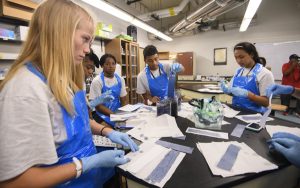
Participants in a CSI Summer camp practice lifting fingerprints from objects. The camp, for middle and high school students around the country, is hosted by the University of Mississippi Department of Chemistry and Biochemistry’s Forensic Chemistry program and the Division of Outreach. Students worked a staged crime scene at the beginning of the camp, and are spending the week learning different techniques used in real forensics labs. They will present their evidence at a mock trial Friday. Photo by Thomas Graning/Ole Miss Communications
Thirty-eight seventh- through 12th-graders visited Ole Miss as part of a weeklong camp on forensic science. Sponsored by the American Academy of Forensic Science, and the UM Department of Chemistry and Biochemistry and Division of Outreach, the event drew students from Mississippi, Alabama, California, Illinois, Louisiana, Missouri, New Mexico, Ohio and Tennessee.
Led by UM forensic chemistry program director Murrell Godfrey and his students, the group spent Monday honing detective skills while examining the “evidence” throughout select classrooms and labs in Coulter Hall.
“The CSI Camp gives hands-on experiences to students who love puzzles, science and watching forensic science television shows,” Godfrey said. “During the week, students learned the importance of the correct chain of custody procedures when handling evidence that they collect at the crime scene. Students must analyze the evidence using presumptive and confirmatory tests.”
Graduate student Caroline Spencer of Decatur, Alabama, assisted with instruction. Kelly Nolan, another graduate student from Oxford, coordinated housing and meals through the Division of Outreach. Undergraduate students Zachara Catchings of Jackson and Ebone McCowan of Acworth, Georgia, served as camp counselors.
Participants observed as Godfrey and others demonstrated the proper procedures for analysis of the staged evidence recovered from the mock crime scene.
Some of the hands-on activities include DNA, fingerprint, gunshot residue, bullet and drug analyses using the same high-tech analytical and physical techniques used in crime laboratories. Todd Davis from the Drug Enforcement Agency and Captain Elijah Wilson of the Holly Springs Police Department presented talks on problems with controlling drugs and crime scene investigations, respectively.
A mock trial in the School of Law‘s moot court room on the last day of the camp tests the students’ knowledge on the various topics and labs.
“The students must serve as expert witnesses, prosecutors, defense attorneys, suspect and so forth,” Godfrey said. “The expert witnesses must defend their analysis of the different pieces of evidence found at the crime scene. A jury will then render a final decision in the case.”
Divided into smaller groups, the students rotated daily between labs in the Thad Cochran Research Center and stations for DNA collection, presumptive tests, ballistics and gunshot residue, fingerprints, and analytical chemistry and forensics. At each specific station, students analyzed their samples and collected data.
A tour of campus and the UM medicinal plant gardens was scheduled on Wednesday by Don Stanford, assistant director of UM’s Research Institute of Pharmaceutical Sciences.
This forensics summer camp was the second held at the university.
“Our first CSI Camp was held last summer, and we had 30 campers representing 15 states,” Godfrey said. “Our goal is always to encourage these gifted young minds to become STEM (science, technology, engineering and mathematics) majors once they enter college.”
Several students said they’ve learned a great deal through their experience.
“I really like looking at the crime scene, collecting evidence and figuring out how the crime happened,” said Kira Brown, a rising ninth-grader from Falkville, Alabama.
Seventh-grader Kailynn Aragon agreed.
“It was remarkable,” said Aragon, from Albuquerque, New Mexico. “The camp helped me learn everything about CSI and the importance of taking good notes.”
“It’s definitely more than using goggles and gloves,” said another eighth-grade student. “I learned that while shows like ‘CSI’ show only one barrier around a crime scene, there are actually two barriers. I also discovered it actually takes much longer to process evidence and solve a case in real life than it does on television.”
By allowing the students to visit the department and experiment with the equipment, UM faculty said they hope to pique their interests in forensic chemistry and possibly recruit them one day to the university.
Chemistry Welcomes New Tenure-Track Faculty Member
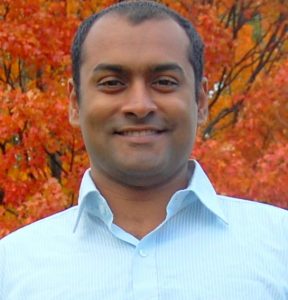 The Department of Chemistry and Biochemistry at Ole Miss WELCOMES Dr. Saumen Chakraborty, our newest tenure-track assistant professor. Dr. Chakraborty, who is a biochemist, completed his Ph.D. studies at the University of Michigan and postdoctoral studies at both the University of Illinois and Los Alamos National Laboratory. Dr. Chakraborty’s research lies at the interface between inorganic chemistry and biochemistry. Students interested in joining his research group may contact the Department of Chemistry and Biochemistry.
The Department of Chemistry and Biochemistry at Ole Miss WELCOMES Dr. Saumen Chakraborty, our newest tenure-track assistant professor. Dr. Chakraborty, who is a biochemist, completed his Ph.D. studies at the University of Michigan and postdoctoral studies at both the University of Illinois and Los Alamos National Laboratory. Dr. Chakraborty’s research lies at the interface between inorganic chemistry and biochemistry. Students interested in joining his research group may contact the Department of Chemistry and Biochemistry.
